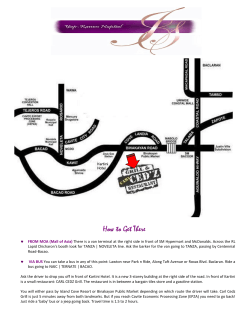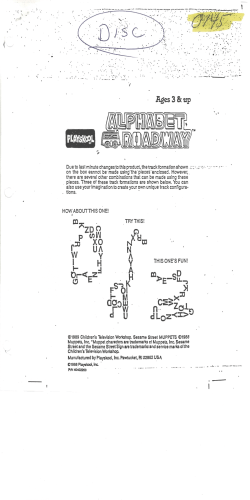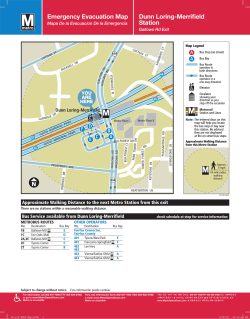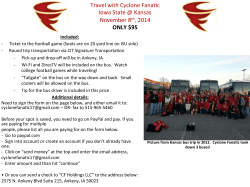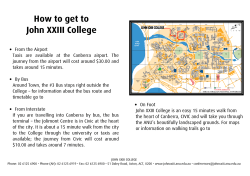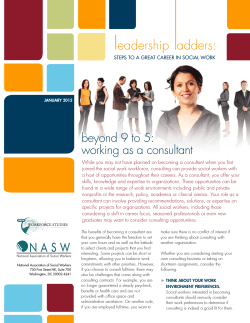
Nov-Dec-Jan 2015 - SC National Association of Social Workers
BUSINESS NAME Chapter Update Nov-Dec-January 2015 Newsletter Date Chapter Update Nov-Dec-January 2015 Spring Symposium Plans are well underway for our 2015 Spring Symposium, to be held March 23-25 at the Marriott Hotel in downtown Columbia. The theme this year is: Social Work Paves the Way for Change. We are pleased to have some dynamic speakers already booked. Dr. Roberta Greene, our opening plenary speaker, was professor and the Louis and Ann Wolens Centennial Chair in Gerontology and Social Welfare at the School of Social Work University of Texas-Austin. She previously was professor and dean at the Indiana University School of Social Work and has worked at the Council on Social Work Education and the National Association of Social Workers. Dr. Greene has numerous publications including Resiliency Theory: An Integrated Framework for Practice, Research, and Policy; Social Work with the Aged and Their Families, and Human Behavior Theory and Social Work Practice. She served on the Commission on Educational Policy and Innovation. Chapter Update Editorial Committee Sandra Grimble, Chair Carla Damron, staff Juliana Palyok, staff Tawanda Rouse, MSW Intern Contributor Alek Dolge, MSW Intern Contributor Sally Hayes, proof reader In addition, Darrel Wheeler, PhD, MPH, President of the National Association of Social Workers will present. Since 2011, he has been the dean of Loyola University’s School of Social Work; prior to his post at Loyola, Wheeler was associate dean for research and community partnerships at the Silberman School of Social Work at Hunter College (CUNY). Wheeler is an educator and researcher who is one of the leading social work experts on HIV prevention and intervention, particularly in the AfricanAmerican gay, bisexual, and transgender communities. He has authored and co-authored many articles, book chapters and monographs on AIDS. Teresa Arnold, State Director of AARP SC will be our closing speaker. Forty-eight additional workshops will be offered. Registration is scheduled to open by January 1. Please check our website: www.scnasw.org for up-to -date information. WHAT’S INSIDE: From Where I Sit 2 The President’s Letter 3 Bourdieu’s Theory vs The Bus 4 Globalize 13 5 Ethics Consulting Hours 7 Lifelines 9 NASW Links 10 Chapter Update Nov-Dec-January 2015 Page 2 From Where I Sit Carla Damron, LISW-CP, Executive Director “We already have him. He was running up the road. He says he came to rake yards.” “I didn’t see a rake,” I said. The officer shrugged. “Neither did we.” “Let me call my neighbor.” I should have done that immediately. I dialed Gloria’s cell phone and told her what happened. It was a typical Friday morning; I was down in my home office writing and drinking (worshipping) my coffee. Around ten, as I climbed the steps for a refill, I glanced out our dining room window. A young man ran down our porch steps and across the lawn. A delivery guy, I decided, so I opened the front door expecting a package. Nothing was there. “I’m not at home,” she said. “Did you hire anyone to rake your yard?” “Yes. A teenager who lives up the street. Bobby Johnson (Not his real name). He’s emotionally disturbed. Autism, I think.” I described the “suspect” and Gloria said that sounded I watched the young man bolt across the street to a like Bobby. “Maybe he came to the house and when I house which is being renovated. He climbed the front wasn’t there he tried the other houses,” Gloria said. steps and tugged on the door knob. He then ran to a So now I felt terrible. This kid with autism had come side door and attempted to open it. Unsuccessful, he to rake and I’d called the police on him. I ran up the moved behind the house. road to explain the situation and found six police ofI grabbed my cell and dialed 9-1-1. “I think ficers surrounding the pale, very scared looking teen. someone’s trying to break into a house,” I said. The He looked at me and said, “Hey, Miss Gloria.” Clearkid reappeared and approached the brick ranch next ly, he was confused. I felt relieved when I saw they door to the home he’d just tried to enter, again trying hadn’t handcuffed him. to open a side door. “Can you describe the suspect?” the 911 operator asked me. I pulled an officer and his captain aside and explained what I’d learned. The captain told the other officers, “Special needs, guys,” and the tone immediately changed. An aggressive, “What were you doing at those houses?” turned into “You can’t try to open people’s doors. It can get you in trouble. It isn’t even safe to do that.” “I’m looking right at him.” I watched him scurry around to the front and pull on the knob to that door. “White kid, dark sweatshirt and dark pants, thin, has short black hair. And now he’s crossing the street Bobby’s mom was called. No charges were filed. again and going to my next-door neighbor’s.” This kid was not a subtle crook. I wondered if he was That afternoon, his mother called me. We had never very desperate (drug seeking?), or simply not very met. I worried she’d be angry about what happened, but instead, she wanted information. We ended up smart. having a forty-five minute conversation in my front “Police are on their way,” the operator said. yard. She explained how Bobby was only recently diagnosed. He’s a highly intelligent, yet very disabled Ten minutes later, a police officer arrived and asked young man, who functions socially between the ages me to again describe what I saw. I repeated what I’d of five and eight. He attends a special school program told the operator. Continued, Page 7 Chapter Update Nov-Dec-January 2015 Page 3 The President’s Letter Jeanne Cook, MEd, MSW, PhD, LISW-CP Chapter President decision in favor of the school districts, the SC General Assembly will finally be forced to provide equitable funding to the rural school districts located along I 95 (the subject of the documentary The Corridor of Shame). AN ATTITUDE OF GRATITUDE I saw Senator Al Franken (D-MN) on television last week. He is one of my favorite U.S. senators because he is smart, progressive, and caring. Franken is also one of my favorite satirists and was a regular on Saturday Night Live. One of his characters on SNL was Stuart Smalley, a self-help guru and member of numerous twelve-step programs. Stuart had many quotable quotes, including reminding viewers that they should have “an attitude of gratitude.” It seems to me that social workers need to take stock of this from time to time. So during this holiday season and in honor of Senator Franken, here goes my list. Some of the things I am grateful for: NASW SC Executive Director Carla Damron and Office Manager Juliana Paylok who keep the Chapter humming along. Their talent, energy, and knowledge are amazing. The NASWSC Board of Directors. The Board does a fine job of guiding the Chapter overseeing our initiatives and activities. The local units of NASWSC for their great community work, including chapter meetings where one can learn about a topic relevant to our profession and get CEUS at a minimal cost. The SC Supreme Court ruling on Abbeville County v State of SC. As a result of the Court’s Governor Haley’s declaration of December as Random Acts of Kindness month. I wish she would do a few RAKs of support on issues social workers care about. Governor Haley again for appointing a task force to study criminal domestic violence. Since SC is ranked 2nd in the nations for deaths resulting from CDV, it is appropriate that our governor for the next 4 years do something to address this issue. Attorney General Alan Wilson and State Senator Larry Martin for advocating for a stronger criminal domestic violence law in SC. Senator Martin introduced the bill and AG Wilson spoke before the Senate subcommittee in support of revisions in current state law to put emphasis on the severity of a CDV act rather than the number of incidents when determining criminal penalties. US District Judge Richard Gergel for his November ruling that declared SC’s ban on same sex marriage as unconstitutional and to the US Supreme Court for refusing to hear the state’s appeal of this decision. As a result, marriage equality in SC is legal. Circuit Court Judge Carmen Mullin for vacating the conviction of George Stinney, Jr. In Alcolu, SC in1944, Stinney an African American youth was only 14 years old when he was convicted for killing 2 young white girls)by an all white male jury based on speculative testimony by prosecution accompanied by no presentation by the defense attorney. Stinney was continued, page 9 Chapter Update Bourdieu’s Theory -vs- The Bus By Tawanda Rouse, SW Intern I learned of the French sociologist, Pierre Bourdieu’s Theory of Practice this past summer in my Human Behavior and the Social Environment (HBSE) class. The first half of fall semester, that theory became alive for me. In a diluted version, Bourdieu’s theory of practice highlights that our society is hierarchical and resources are distributed unequally. Groups of people live in several social classes with varying quantities of resources- economic capital, cultural capital, linguistic capital, symbolic capital, and social capital. Based off the shared life experiences of those individuals and their capital, those in the same strata tend to bond and rarely seek out opportunities to bridge the social strata. Now, I don’t know if the Central Midlands Regional Transit Authority (CMRTRA, Columbia’s bus system) considers itself to be a vehicle (excuse the pun) used to allow people to have access to resources that is necessary for social mobility, but even if by unintended consequence, it is such an instrument. Bridging As a new resident of Columbia, South Carolina in 2011, I learned of the threat to discontinue full week scheduled bus rides provided by CMRTA, currently operating as The Comet. Coming from a smaller city and rural county like Florence, with limited bus transit routes, I understood the need for a comprehensive public transportation line for a city and county as large as Columbia-Richland. As a concerned citizen and residential stakeholder, I understood the need to provide a service to a community at the best level possible and to advocate for the community to fund the need. When the time came to vote for the Transportation Tax, I made sure that my vote was in favor of what I had advocated for. Over the next 22 years or until it reaches the 1.07 billion dollar mark, the 1% sales tax will be in effect for all of Richland City and County residents who buy groceries. Twenty-nine percent ($300,991,000) of those funds will be allocated to the transit system provided by Central Midlands Regional Transit Authority (CMRTA). Nov-Dec-January 2015 Page 4 Bonding Let’s fast forward to July, 2014, when I had to depend on The Comet for reliable transportation to work, school, meetings, and appointments. I am grieved to report that the service seemed to deteriorate during those hot, rainy, hill-walking, 75 days! From bus routes running 5 to 45 minutes past scheduled route times; to bus drivers disregarding the definition of “connecting bus route” to me with a right shoulder injury (sling and all); to chasing down a bus (being so close that I touched it) that obviously the driver had to see me; to twisting my foot after being dropped off at a undesignated bus stop; to CMRTA administrative staff being elusive and unresponsive. Unfortunately, I could continue this list of woes and more than frustrating mishaps. Thinking of Bourdieu, I began to think about my plight and realized that I had become “a people like them”. Before “the bus”, as I like to call it, I was an educated woman, fairly independent, financially responsible, culturally sensitive, and associated with people of clout. I had various amounts of capital! On the bus though, you become a person that no one sees, understands, or cares to know your struggles, except those that are riding the bus with you. Still, I am optimistic that the transportation system was and still may be going through a transitional phase. I’m hoping that “the bus” will get it together to be a part of Bourdieu’s Theory of Practice. Instead of stalling out, CMRTA will be an effective and efficient resource to drive people forward on their way to social mobility. Page 5 Chapter Update Globalize 13 By Alek Dolge, SW Intern Frederick Douglass once said, “It is easier to build strong children than to repair broken men”. This statement could not have been truer than on the 17th of November 2014. The students at Westwood High School in Blythewood, SC hosted the Frederick Douglass Family Initiatives (FDFI), City Council, Appleseed Legal Justice, and NASW-SC to celebrate their movement to educate and bring awareness Nov-December-January 2015 tered on abolishing modern day slavery. These modern-day abolitionists were enthusiastic to share with assembly members what they learned through their service-learning projects. The limit did not exist for these students and their learning experience. After they began their studies last year, they craved more and asked for additional resources, including books in the library. Following a syllabus is important; however, the librarians, teachers, and principal all worked together and supported their students to learn outside of heir learning structure. For them, having students excited about learning and soaking knowledge in like a sponge, encouraged them and they too wanted to learn more. Books and media sources were provided to the student body. Through song, videos, readings, and even interpretative dance, these kids communicated what they’d learned about trafficking. Their passion shone through each presentation. The students noticed an injustice and worked to educate themselves, ask for help, and host an event to do something, and do something they did. Children are a vulnerable group, and for these children to stand projecting one voice that human trafficking must end, was quite remarkable. What does this mean for our future or what does the next generation hold? I’m unsure if anyone really knows the answer to these questions but one thing is for sure, these children are advocates! Whatever career path these children take, it is encouraging to know that within them are advocates who are willing to go against the odds to modern-day-slavery also known as human traf- for justice. ficking. The keynote speaker, Kenneth Morris, Jr., gave a speech centered on the notion that in order to move forward we need to understand our past. The students did just that. What first began as a class project last year studying the 13th Amendment and narrative of Frederick Douglass’ life, turned into a high school awareness project. Students from all subjects and class ranks began to uncover the truth about slavery then and now. Globalize 13 is FDFI school-based curriculum cen- Have You Taken our Survey? It’s not too late to take our Social Worker Perceptions of Safety in the Field Survey! We need your input. Go here: https://www.surveymonkey.com/s/naswsc Thank you! Chapter Update Nov-December-January 2015 Page 7 From Where I Sit, Continued Monday-Thursday, and receives an hour of therapy every day. “But I now see I can’t leave him unsupervised on Fridays,” she said. After his encounter with the police, Bobby had spent the afternoon crying in bed. I tried to imagine how terrifying his experience had been. My guilt about calling the police quickly dissolved; he needed to learn that his behavior was dangerous. There are several ways this could have gone horribly wrong. For example, I think Bobby is lucky that he is white. Had he been an African American young man, dressed in dark clothes, attempting to enter houses— would the police response have been more hostile? I want to say no. I want to think we are all treated the same, but that isn’t always the case, is it? Extended Ethics Consulting Hours from NASW-OEPR In an effort to improve the members’ ethics consultation experience, the Office of Ethics and Professional Review (OEPR) is excited to announce the extension of the ethics consultation days and hours. Beginning Monday, January 5, 2015, ethics consultations will be provided as follows: Hours & Contact Info (800) 638-8799 Mondays 1:00pm – 4:00pm (ET) ext. 223 Tuesdays 10:00am – 1:00pm (ET) ext. 231 Wednesdays 1:00pm – 4:00pm (ET) ext. 223 Thursdays 10:00am – 1:00pm (ET) ext. 231 Also, we live in a “stand your ground” state. Had Bobby tried to open the wrong door, I hate to think what might have happened. Lastly, Bobby has a mental illness. For years, people with mental illnesses have ended up in jails and prisons; it’s even said among mental health advocates that Richland County’s Alvin S Glenn Detention Center is the largest psychiatric institution in our state. But Bobby didn’t go to jail. Once the police learned of his autism, they showed concern and sensitivity in how they dealt with him. They backed away. They used a gentler, more paternal tone. They wanted him to see that what he did was wrong, and could get him hurt. I feel for Bobby and his family as they come to terms with his disorder. He does have a habit of “sneaking into places,” his mom told me. I hope what happened will discourage that behavior. It may, or may not; Bobby processes information in a different way than you and I. If he does have future interactions with law enforcement, I pray they treat him like the officers did that afternoon--as a confused kid who needs help. There are lots of additional exciting plans for the OEPR in 2015, including: Ethics 8 Monthly Tips Ethical Standard of the Month Code of Ethics app National Professional Review Process …and much more! Please stay tuned! http://www.socialworkblog.org/featured-articles/2014/12/ nasw-expanding-ethics-consultation-days-and-hours/ Chapter Update President’s Letter, continued from page 3 for the crime. Judge Mullin’s called the verdict shocking and extremely unfair. President Obama for using his executive action power for immigration amnesty. Perhaps now Congress will pass a bill on immigration reform. President Obama again for getting a diplomatic relationship with Cuba reestablished. Mrs. Rosa Parks who refused to give up her seat in the “white” section of a Montgomery, AL bus on December 1, 1955. And to Mrs. Sarah Mae Flemming who did the same thing on a Columbia, SC bus on June 22, 1954. These brave women made a valuable contribution to civil rights. As we close out 2014, let’s remember all the big and small ways that people contribute to successful advocacy efforts. They help make all our lives better. So to each of you reading this: Merry Christmas. Happy Holidays. Happy Hanukkah. May a Happy Kwanzaa be followed by a happier new year. And remember to develop your own ATTITUDE OF GRATITUDE. From NASW-SC! Nov-Dec-January 2015 LifeLines: Stories from the Human Safety Net Greg Wright, NASW The University of Maryland Journalism Center on Children and Families, with suppor t of the NASW Foundation, commissioned pr ofessional journalists to do the project, Lifelines: Stories from the Human Safety Net. These print, radio, video and even cartoon stories will educate the public and reporters about the various ways social workers help people across our nation overcome life's hurdles. In this SocialWorkersSpeak.org article we also gave social workers tips on how to use the package during Social Work Month and beyond to get reporters to cover more stories involving social workers and issues important to the profession. The stories come in a variety of formats – audio, video, print and even a cartoon – and delve into many of the kinds of work social workers do. During the Holidays and beyond, take time to check it out Lifelines: Stories from the Human Safety Net. http://joblink.socialworkers.org/jobs The PACE online fundraising tool has been officially launched! It can be found at : http://socialworkers.org/pace/default.asp There’s also a link to it from www. socialworkers. org. Please remember that all online contributions will be shared with the chapters, just like contributions we receive through membership renewals. So it’s in our interest to promote the new online fundraising capability. CEUSchool’s goal is to provide you with quality on-line course content in a format that is convenient to use, affordable, and relevant for today's social worker. Their site offers fully accredited NASW classes that meet all of your CEU needs. You will receive the same academic benefits that you would enjoy at an onsite facility, along with the flexibility and self-paced learning that comes with an online education. http://nasw.interactyx.com/ Register with CEUSchool through NASW South Carolina and you will automatically receive 3 FREE credits !! We love your stories! NASW SC encourages everyone to contribute noteworthy information for Chapter Update. All material should be typed and emailed to the Chapter Office. Chapter Update is published by the National Association of Social Workers South Carolina Chapter. For information about advertising in the newsletter or renting membership labels, contact the chapter office at (803) 2568406. NASW reserves the right to accept, reject or edit advertisements and notices of events based on publication schedule, space limitations and appropriateness. The views expressed in Chapter Update do not necessarily represent positions of NASW. Because of the commitment of NASW to nondiscriminatory personnel practices, advertisers in NASW publications, by action of the NASW Board of Directors, must affirm that they are equal opportunity employers. For violations of professional ethics or personnel practices, a person may file a complaint with the NASW SC Chapter Committee on Inquiry. For information, write the Chapter Office at 2537 Gervais Street, Columbia SC 29204 or call 803-256-8406. For information regarding: Social work licensure, call or write the Board of Social Work Examiners, PO Box 11329, Columbia, SC 29211-1329, 803-896-4665, www.llr.state.sc.us
© Copyright 2026

